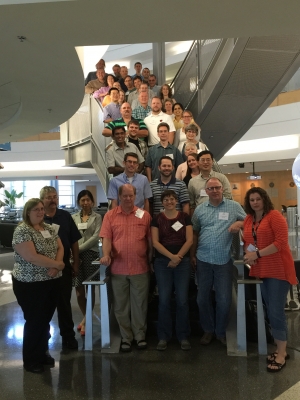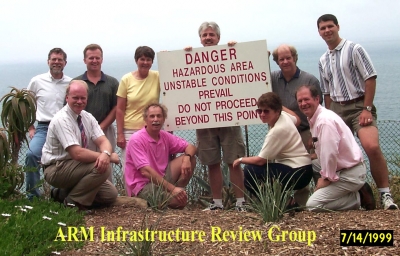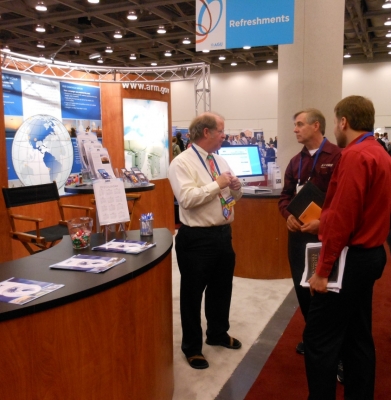ARM’s Archive Manager About to Retire
Published: 18 April 2016
Raymond McCord, long-time Archive Manager, retires at the end of May

One of Raymond McCord’s last acts at Archive Manager for the Atmospheric Radiation Measurement (ARM) Climate Research Facility will be to attend the ARM/Atmospheric System Research Joint User Group/Principal Investigator Meeting in Tysons Corner, Virginia, from May 2 to 5. This will provide a fitting opportunity for ARM staff—and many in the wider atmospheric sciences community—to offer a heartfelt “thank you!” in saluting the key architect of the ARM Facility’s globally renowned data systems. After 21 years of exemplary service, McCord is trading the satisfactions and challenges of ARM’s ambitious climate measurement mission for the quieter pleasures of family and personal pursuits.
Connecting to the End User
One of ARM’s “old guard,” McCord joined the facility in 1995 as the second Data Archive Manager, taking over from Paul Singley. McCord drew on his previous experience designing and managing data systems for other major environmental projects to expand the existing archive, which then held 2.5 years of recorded data. His leadership helped establish ARM’s current archive at a time when online data discovery and distribution were relatively new.
Creating a data system that connects to the end user has always been his goal. Based throughout his ARM tenure at Oak Ridge National Laboratory (ORNL), McCord has been tireless in his efforts to enable better science through increased access to, and use of data. He has succeeded: Many scientists have told him that “The Archive works and I can get data as needed.”
Growing Data Demands

McCord’s ARM career has taken him to China, Brazil, Europe, and South Africa, where he has faced unusual challenges such as evaluating data management problems in developing countries. Overall, McCord says that ARM’s thorniest data problems have fallen into two categories: radar data and aerosol data.
Radar data have grown hugely in volume and complexity in recent years as a result of new types of radar, higher pulse rates, multi-pulse patterns, and new plotting methods. Aerosol data, though expanding less rapidly in volume, have grown through diversity of events recorded and compounding aerosol formation issues that create detection and standardization problems. For example, black carbon particles vary by type as well as by changes in physical and optical properties due to moisture and other conditional variants. These sorts of nested issues are inherent in the nature of our work, McCord says, so data managers must continue striving to overcome them. The key, he believes, is careful management of metadata, which helps define how the data may be valuable to science.
McCord’s favorite ARM memories include:
- Helping with site selection logistics for the ARM Mobile Facility in Germany and considering how the setting could impact measurements
- Participating in a challenging meeting about alternative future structures for ARM at Scripps Institute, a beautiful site overlooking the Pacific Ocean
- Meeting and engaging random scientists at ARM’s booth at the American Geophysical Union (AGU) for seven years (see below).
All About People

McCord notes that what he’ll miss most at ARM are the people, whose diverse disciplinary and institutional perspectives drive the facility’s accomplishments. He feels that getting everyone to focus on goals with specific outcomes that can benefit many needs, including future ones, has always been ARM’s main challenge.
His personal role in that larger picture has been translating researchers’ requirements into something “data systems can do.” Scientists always want more data, McCord says, but rarely have the resources or context to fully exploit the data. Helping to define priorities for data systems and bridge the gap between data collectors and data users have been two of his key contributions to ARM’s mission. McCord’s typical activities have included performing project management, advising about data issues, and managing costs to keep the Archive performing to expectations. As he puts it, “Scientific data managers anywhere are committed 100+ percent, forever. Unlike researchers, he or she gets no break between projects.”
A Science Person
Significantly, McCord’s critical thinking to mesh scientific needs with potential data systems capabilities was largely won through experience. This is the critical intersection where McCord’s background in botany, zoology, math, and chemistry (B.S., Western Illinois University), as well as ecology (M.S., Ph.D., University of Tennessee), has helped him counsel scientists about the possibilities and limitations of data collection and analysis. As he readily admits, “I’m more a scientist than a computer person.”
McCord cautions those just entering the field that how they do things now will change radically in the future. Citing his own career, he sees “no comparison” between what he does now and what he could do during the era of Fortran and punch cards, before either networks or the Internet existed. Above all, he cautions, listening is the most important skill, closely followed by patience and persistence. Good ideas take time to mature, McCord advises. Early in one’s career, a few years may seem an eternity to see a concept come to fruition, but viewed at the scale of decades, it can be worth the wait. Finally, he recommends keeping good notes because accumulating experiences become harder to remember.
McCord is confident that the ARM Facility has a bright future, with its ambitions and operations constantly increasing in pace and scale. He believes that much more progress is required in facilitating timely and efficient data flow. In just 20 years, ARM’s Data Archive has grown from 695,000 data files to 17 million, and from 208 gigabytes to a phenomenal 807 terabytes. McCord knows ARM’s people will meet this challenge, as usual, through their unselfish, co-operative work style. He notes the low staff turnover rate as proof that ARM staff members stay the course to get the job done.
McCord plans to retire in Tennessee near ORNL, spending more time with his wife, as well as his daughter and her family, and enjoying outdoor recreation, reading, and music. Never one to slow down, Raymond looks forward to a retirement as “full speed”—the same pace he maintained throughout his career. All of us at ARM hope he achieves his new objective, while we build on his legacy of excellent data management.
# # #
The ARM Climate Research Facility is a national scientific user facility funded through the U.S. Department of Energy’s Office of Science. The ARM Facility is operated by nine Department of Energy national laboratories, including Oak Ridge National Laboratory, which manages the ARM Data Archive.
The ARM Climate Research Facility is a DOE Office of Science user facility. The ARM Facility is operated by nine DOE national laboratories, including .
Keep up with the Atmospheric Observer
Updates on ARM news, events, and opportunities delivered to your inbox
ARM User Profile
ARM welcomes users from all institutions and nations. A free ARM user account is needed to access ARM data.


















